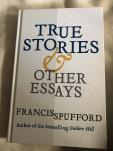Having the gift of space to read and think, it must not be wasted. While in Sudan last week I read Lindsey Hilsum’s biography of murdered journalist Marie Colvin, In Extremis, and Orhan Pamuk’s novel The Red-haired Woman. Now in Jena, Germany, I am reading Francis Spufford’s True Stories and Other Essays. This morning I took a look around the bookshop and read Mark Twain’s The Awful German Languagewhich had me laughing from the first to the last page.
Jena is where Hegel taught and where Schiller met Goethe. On the hills above the town Napoleon had his own encounter with German determination. On 14 October 1806 at the twin battles of Jena and Auerstedt Napoleon defeated the Prussian armies, subjugating the Kingdom of Prussia to the French Empire for the next six years. There were 50,000 casualties, the soil rich with the blood of now-forgotten humanity.

This isn’t some naïve approval of Soviet statism or nostalgic reference to planned economies, but, rather, an exercise in trying to enable a new generation to inhabit a world that is now long gone. Most people now simply recall the collapse of the Soviet experiment – with few tears shed – and cannot imagine what it was to live through it without the benefit of hindsight. These essays need to be read in order to do justice to his case (and I now need to read the novel itself).
This has caught my own attention because it recalled for me an experience I had some years ago when I had been asked by a media production company to write an obituary for Pope John Paul II that could be broadcast in the event of his death. With a limited word-count I wanted to capture his part in the destruction of Soviet Communism, but in an evocative word or two. I chose to speak of ‘Politbüro’, but was told by the producer that this sounded ‘political’. I clarified that it is political, and that that is the point. Subsequent discussion led to a sort of enlightenment moment for me: the producer was in her mid-twenties, was born around the time of the fall of the (Berlin) Wall, and had no lived experience of the Cold War or a divided Europe. She had grown in the unipolar world of capitalist free-market monopoly. I, on the other hand, had grown up with the threat of nuclear cataclysm, had known people whose family was separated by the borders of East and West Europe, and had then worked at GCHQ as a professional linguist at the fag end of the Cold War (the first half of the 1980s).

This is what Spufford addresses in his novel and explains in his essays. We are all time-bound. I can try to explain or describe the thought world I inhabit, but, shaped as it is by my actual history and my personal limited visions and experiences, I have now to allow others to inhabit their world and bring to their conversation (and judgements) the assumed permanences of their perspective, knowing that they are provisional, limited and partial.
It reinforces the need to listen carefully in any dialogue, to interpret wisely, and to learn again to look – with humility – through the eyes of the other at why the world is the way it is and what can and cannot be taken for granted as common.
Advertisements